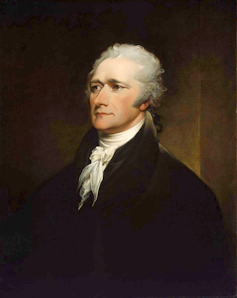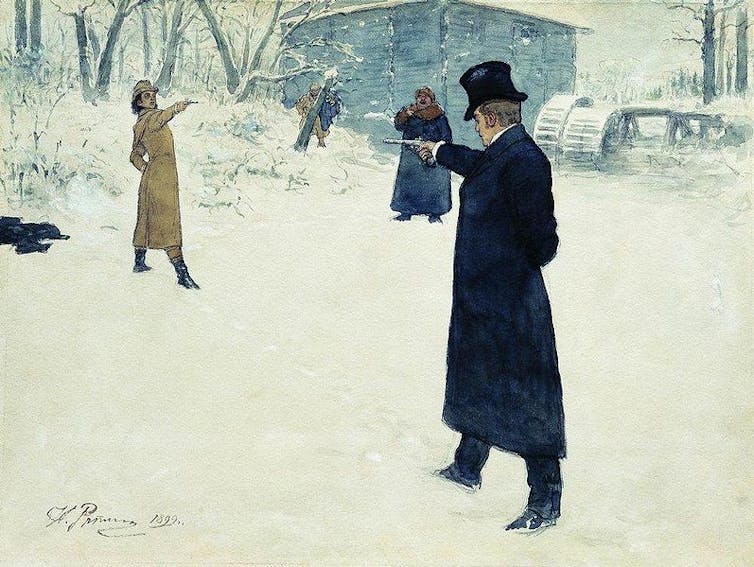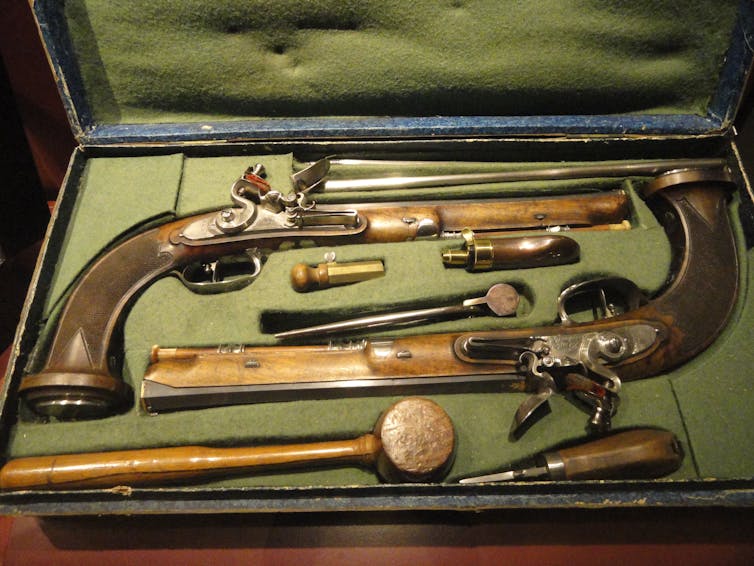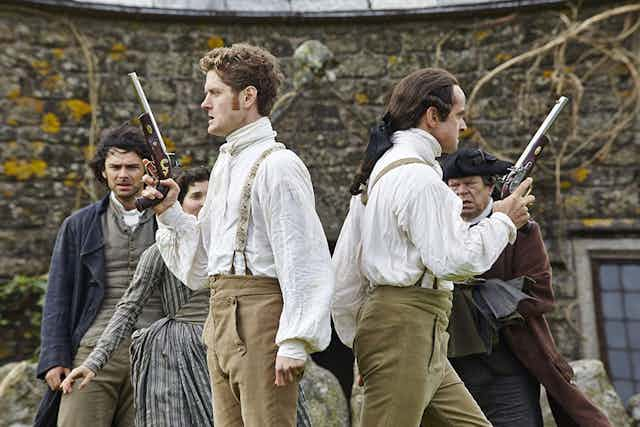Duelling has gone down in history as a rather quaint and misunderstood practice, a butt of the joke in historical comedies and references. However, duelling was once not only common but considered the pinnacle of honour and bravery, an event that could change one’s reputation - and indeed end one’s life - in a pull of a trigger.

It is extraordinary, and a little fantastical to our modern mind to think that some of the most famous and respected individuals in history, such as Alexander Hamilton, one of the Founding Fathers of the U.S. and the seventh President of the U.S. Andrew Jackson, both fought in many duels. Hamilton died in a duel in 1804. Jackson duelled over 100 times, was wounded in two and killed at least one man.
In our age of “trolling” and social media wars, the idea that one man may calmly, and according to proper social rules, kill another over an accusation of cheating at cards, or of being a corrupt or incompetent politician, seems utterly barbaric. This modern incomprehension frequently shows in popular media. Modern filmmakers and writers of TV series and musicals can’t help projecting their own feelings when interpreting duelling in their work.
Take, for example, the successful musical Hamilton based on Alexander Hamilton’s life. The Burr-Hamilton duel, which ended Hamilton’s life, is portrayed in several songs. In one song, founding father Aaron Burr sings, “Can we agree that duels are dumb and immature?” and declares that the whole affair is “absurd”. It must certainly have seemed so to Lin-Manuel Miranda, who wrote the lyrics, but Burr himself probably had very different feelings on the matter.
Recent TV shows set in the 18th and early 19th century, notably Poldark and the 2016 BBC mini-series adaptation of Tolstoy’s War and Peace, depict duels similarly.
In the duel between Pierre and Dolokhov in the miniseries of Tolstoy’s novel, the words “I know it’s stupid but I think I must go through with it” are put into Pierre’s mouth. They encompass what the creators probably understood about duels – that they are stupid, but must be fought, for some unknown reason.
And in season four of Poldark, the main character utters, “My only regret is that I apologised in the first place”, to drive home the point that his faulty pride regrettably caused the duel.
This is not to argue that duels were in any way positive affairs, and should be portrayed as such.
The duel was a highly ritualized activity practised mainly by the upper classes from about 1500 to 1900. It was held in private, usually at dawn, as duelling was illegal throughout Europe and America. It was seen as neither a recreational sport, nor an urge or uncontrollable male aggression - the duel was an affair of honour. In the words of Samuel Johnson:
In a state of highly polished society, an affront is held to be a serious injury. It must, therefore, be resented, or rather a duel must be fought upon it.
Honour was a most crucial concept for gentlemen, and ladies, tied up with one’s reputation. The importance placed on defending honour made refusing a duel challenge nearly impossible; the social consequences for doing so were severe. Indeed, gentlemen did not shoot each other over trivial matters, but rather over slander and accusations of falsehood or dishonesty.
Duels involving women were not fought to gain a woman’s love, as some modern adaptations try to show, but rather because men took responsibility for the protection of honour of certain women in their lives. The duel, therefore, was a way to honourably and privately resolve offences. Its causes varied from accusations of cheating to women’s infidelity.
Alexander Pushkin, considered by many to be Russia’s greatest poet, died in a duel in 1837, defending the accusations that his wife Natalya had been unfaithful. His death echoed in many ways the famous duel between Eugene Onegin and Vladimir Lensky in Pushkin’s Onegin.

Scrupulous regulation
A duel was scrupulously regulated by an elaborate and detailed set of rules, though the specifics of the duelling code varied between countries. Many codes of duelling and help manuals were published throughout the 18th and 19th century, the most popular being the Irish code duello, published in 1777.
The duelling gentlemen would always have “seconds” - friends whose role was to negotiate a resolution of the dispute to avoid a potentially lethal confrontation, usually to very little success.

The high probability of death was, of course, ever present in duels, especially when pistols became more fashionable than rapiers. Pistols could misfire and rarely shot straight, and could also be deadly in the hands of incompetent seconds, whose task it was to provide and load them.
Doctors were also indispensible in duels. The Art of Duelling, published by “A Traveller” in 1836, warns the duellist to remember to “secure the services of his medical attendant, who will provide himself with all the necessary apparatus for tying up wounds and arteries, and extracting balls”.
Public opinion (and ridicule) eventually led to the death of the duel. By the late 19th century, it was successfully banned by most countries, heavily criticised in the press, and frowned upon by the public.
This was, of course, a good thing, as we can all agree there are far better ways of resolving disputes. But next time you watch a duel on television or in a film, it might be worth recalling the history and meaning of this very serious rite of honour.

